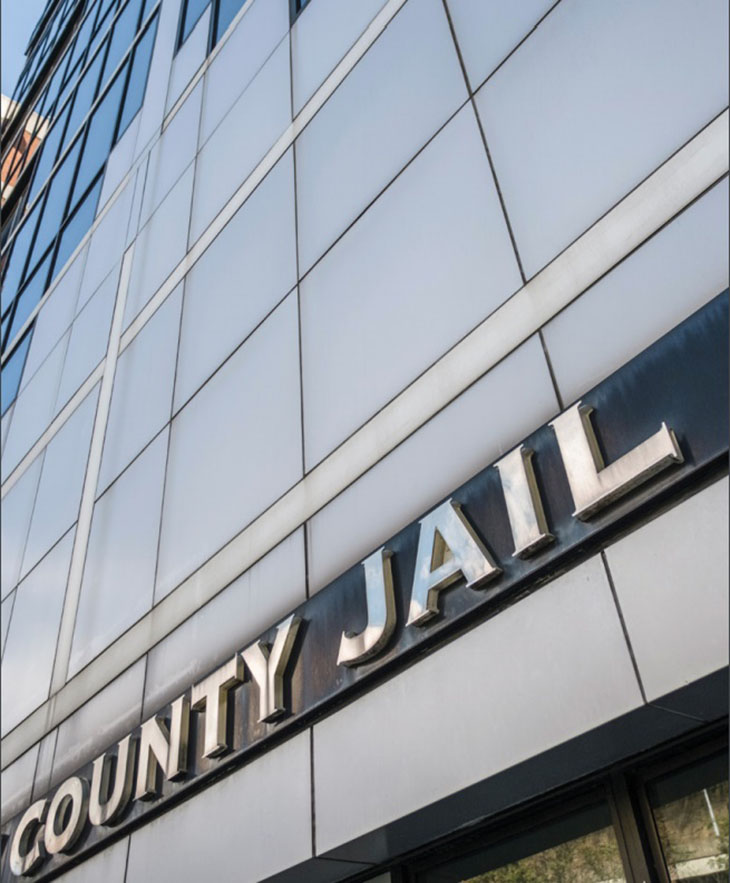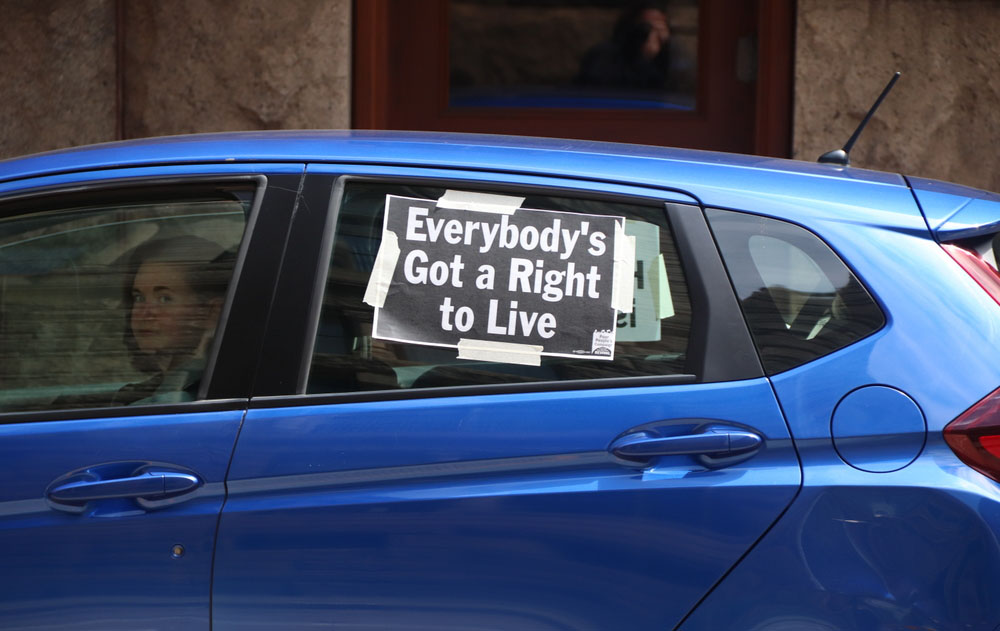LOCKED INSIDE A JAIL DURING A PANDEMIC
by Rob Taylor Jr.
Courier Staff Writer
As coronavirus progressed from a word barely anyone’s ever heard of to a word that no one will ever forget, the one constant that health experts have preached into the minds of the public is to “social distance.” Stay away from others. Remove people from densely-populated areas.
And that’s happened. Sporting events are canceled. Bars and nightclubs are closed. Dine-in restaurants are a no-no.
Schools are closed. High school proms are off. Even the talk shows like “Ellen” and “The Tonight Show with Jimmy Fallon” broadcast from home.
But the Allegheny County Jail (ACJ), the enclosed, sometimes densely-populated facility that houses inmates, still has more than 1,500 people in its quarters.

(County Jail photo courtesy University of Pittsburgh)
And it’s caused a number of protests outside the Allegheny County Courthouse, Downtown, as some people are demanding that even more inmates be released from the jail due to health and safety concerns caused by the coronavirus pandemic, as well as providing better overall treatment of the inmates.
The latest protest came on April 22, as roughly 25 cars with horns honking and signs taped to the doors and windows circled the Allegheny County Courthouse on Grant Street. Some signs read: “Flatten the curve inside ACJ,” “Everybody’s got a right to live,” “This is a death sentence,” and “Release Black mothers from Allegheny County Jail.”

A PROTESTER had this sign on the window of her car. (Photo by J.L. Martello)
Fawn Walker-Montgomery, Take Action Mon Valley executive director and co-founder, was one of the organizers of the midday protest. “We are calling attention to the way that the inmates and staff are being treated inside ACJ,” she told the New Pittsburgh Courier’s J.L. Martello. “We can’t pick and choose how we practice humanity. If we’re going to flatten the curve in our state, in the county, in the country, we have to pay attention to what’s going on inside of our jails. We need to make sure that the inmates are being allowed to practice social distancing; we have a lot of cells that have opened up because a lot of inmates have been released, so they can use single cells…”
Walker-Montgomery also said she wants both inmates and staff to have masks and gloves.
“These people matter as well,” she said.

FAWN WALKER-MONTGOMERY, with Take Action Mon Valley. (Photo by Courier photographer J.L. Martello)
The Allegheny County Jail has become a hotbed for discussion since the first positive coronavirus case at the jail was made public on March 27, a staff member who hadn’t been involved in direct inmate care.
Advocacy organizations like the American Civil Liberties Union of Pennsylvania and Take Action Mon Valley correctly predicted that it was only a matter of time before coronavirus would spread into the state’s prisons and county jails. The organizations spearheaded an initial letter in March that demanded people in the ACJ who had committed non-violent offenses be immediately released.
Since March 16, the county said, a collaborative effort began between county judges, the Public Defender’s office, the District Attorney’s office, the ACJ, Court Administration, Pretrial Service and Adult Probation to release inmates from the jail.
By March 31, there were 1,564 inmates in the county jail, down more than 600 from the 2,224 inmates that were housed at the beginning of the month.

THIS CAR CAME TO THE APRIL 22 PROTEST DOWNTOWN, with multiple signs taped to it. (Photo by Courier photographer J.L. Martello)
A week later, on April 8, the first ACJ inmate was found to have contracted coronavirus. Two days later, a second inmate tested positive. Two days after that, the third inmate tested positive. And three days later, on April 15, a fourth inmate was found to have coronavirus. The same day, the first vehicle-based protest was held Downtown, engulfing the courthouse, urging judges and other decision-makers to release more inmates.
County officials said there’s been roughly 1,200 inmates that have been released from the Allegheny County Jail since the coronavirus pandemic began. Still, as of May 4, the county’s website stated it had a jail population of 1,635.
More alarming, in the past two weeks, there’s been a spike in positive cases of coronavirus at the jail. As of May 4, there have been 27 inmates who’ve contracted COVID-19, including five staff members.
Additionally, 11 residents at Allegheny County Treatment Alternative, a 50-bed male facility on Fifth Avenue, contracted by the county, have tested positive, along with three employees there.
Walker-Montgomery, reached by email on May 4, reiterated her stance that the county jail should follow Centers for Disease Control and Prevention guidance of social distancing, and “allow for independent space by using single cells and opening levels 1 and 7. They (levels 1 and 7 of the jail) are now available due to people being processed out and programming being shut down.”
She also wants more COVID-19 testing to be occurring at the jail, more mental health treatment and counselors on hand, and an assurance that jail medical staff are trained to spot COVID-19 symptoms.
Walker-Montgomery believes those who’ve committed non-violent offenses should not be in the ACJ, period. And there should be “COVID-19 testing and safe facilities in halfway houses, etc., when people are released.”
Statewide, Gov. Tom Wolf on April 10 ordered state Department of Corrections officials to establish a “Temporary Program to Reprieve Sentences of Incarceration,” which, in effect, released more than 1,000 state prisoners from its facilities.
Those eligible for the program were inmates who were identified as “non-violent” and were eligible for release within the next nine months, and those considered at “high risk” for coronavirus complications and were within a year of their release.
According to the state DOC, as of May 4, there have been three inmate deaths due to COVID-19, all three happening at its SCI Phoenix facility, located about 45 minutes from Philadelphia. In total, as of May 4, there have been 84 positive cases of coronavirus for state prison inmates and 114 for state prison employees within the system. The vast majority of state inmate cases have been at SCI Huntingdon (51) and SCI Phoenix (29).
Given how physically close inmates are on a daily basis, it’s no surprise that coronavirus has reared its ugly head in jails across the country. The Marshall Project, a non-partisan, non-profit news organization that focuses on issues pertaining to the U.S. criminal justice system, is collecting data on the number of inmates across the country who have contracted COVID-19. As of April 29, the organization estimated more than 14,500 inmates nationwide had tested positive for coronavirus, with at least 218 deaths, 41 coming from the state of Michigan, topping the state list.
The Marshall Project reported that New Jersey and Ohio were next on the list, each with 29 inmate deaths as of April 29.
In Massachusetts, a state that hasn’t been on the national radar for a comparably large number of coronavirus cases, its prisons tell another story, according to reporting by WBUR Radio. Boston’s National Public Radio station on April 28 said that the state’s medium-security prison in Shirley, Mass., had 121 positive COVID-19 cases (106 inmates, 15 staff). At the state’s women’s institution in Farmington, Mass., there were 84 positive cases (70 inmates, 14 staff).
In San Antonio, Tex., 34 of the 39 new COVID-19 cases reported on May 4 came from its county jail (Bexar). Out of the roughly 1,650 cases reported in Bexar County as of May 4, 280 have been jail inmates or employees (17 percent).
In Florida’s state prison system, more than 200 inmates have tested positive for COVID-19, with five deaths. And in Miami during the early hours of May 4, a 51-year-old Black inmate, Charles Hobbs Jr., who had tested positive for coronavirus, died after suffering a “medical emergency” inside the jail. Officials suspect, but aren’t 100 percent sure, he died of coronavirus complications.
On a federal prison level, data from the Bureau of Prisons shows that as of May 4, there were 1,984 federal inmates and 356 Bureau of Prisons staff members who have tested positive for coronavirus. Forty federal inmates have died; no staff members have died.
As each day passes, the Allegheny County court system has the final say as to which inmates are eligible to be released. The District Attorney’s Office said in a March 30 statement that “we would call on our community to have confidence that the choices made by this office with respect to the release of certain persons from the county jail, will balance the importance of the safety of the public and the rights of victims, with the health and welfare of those directly impacted by these decisions.”
The DA’s office said they would continue to oppose the release of inmates “charged with the most serious and violent crimes including homicide, aggravated assault, rape, child sexual assault, child physical abuse and domestic violence where the same victim has been assaulted more than once.”
Inside the jail, the county said via the jail’s website that all inmates and staff members have been provided masks, mandatory cleaning sessions across the entire facility have been increased, and “physical distancing is being emphasized…including limiting out-of-cell time to 10 inmates at a time.”
Also, each housing unit has been supplied with bars of soap to increase handwashing and hygiene, and with outside visits suspended, inmates are being allowed one free daily five-minute phone call.
“The health, safety and welfare of the inmates and our staff remains our biggest priority,” read the current statement on the county jail website.
Meanwhile, there was one entity present at the April 22 protest that was able to help an African American mother get out of the jail, so she could be home for her child.
Dignity Act Now Collective, an organization that helps post bail for Black mothers, is dedicated to getting Black mothers out of jail or prison and then providing housing, care packages and job-training, which could translate into a better re-entry for them into the general public.
On April 21, the organization facilitated the release via bail of seven Black mothers who were incarcerated in Philadelphia.
Melannie Taylor, the collective’s director of communications, then drove to Pittsburgh to meet with Ronna Davis-Moore, the collective’s lead organizer for the Pittsburgh area. On April 22, the day of the protest in Downtown Pittsburgh, they were very happy to watch the Black mother (whom the Courier is not identifying) leave the Allegheny County Jail after posting bail.
“COVID-19 right now is killing a lot of Black people, especially in the jails…and we don’t have full communication and we can’t go into the jails,” Taylor told the Courier’s Martello in an exclusive interview. “That’s why it’s super important that we bail out our mothers. No one deserves to go through this (the coronavirus pandemic) without a mother.”
14,513
The number of people in prisons nationwide that have tested positive for
coronavirus
218
The number of people in prisons nationwide that have died after contracting
coronavirus
(Data from The Marshall Project, as of April 29, 2020)
FEATURED IMAGE: JORDAN MALLOY, of Wilkinsburg, was among the protesters demanding that more inmates are released from the Allegheny County Jail due to health and safety concerns during the coronavirus pandemic. The protest was held, April 22, in Downtown Pittsburgh. (Photo by J.L. Martello)